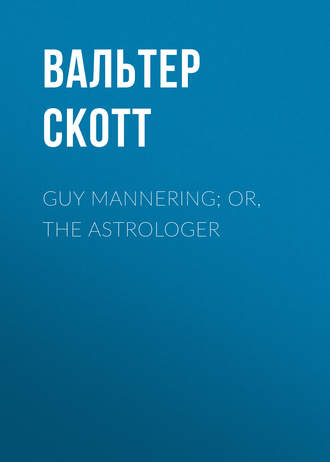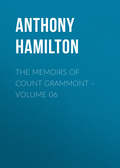
Вальтер Скотт
Guy Mannering; or, The Astrologer
The “Quarterly Review” distinguished itself by stupidity, if not by spite. “The language of ‘Guy Mannering,’ though characteristic, is mean; the state of society, though peculiar, is vulgar. Meg Merrilies is swelled into a very unnatural importance.” The speech of Meg Merrilies to Ellangowan is “one of the few which affords an intelligible extract.” The Author “does not even scruple to overturn the laws of Nature" – because Colonel Mannering resides in the neighbourhood of Ellangowan! “The Author either gravely believes what no other man alive believes, or he has, of malice prepense, committed so great an offence against good taste as to build his story on what he must know to be a contemptible absurdity… The greater part of the characters, their manners and dialect, are at once barbarous and vulgar, extravagant and mean… The work would be, on the whole, improved by being translated into English. Though we cannot, on the whole, speak of the novel with approbation, we will not affect to deny that we read it with interest, and that it repaid us with amusement.”
It is in reviewing “The Antiquary” that the immortal idiot of the “Quarterly” complains about “the dark dialect of Anglified Erse.” Published criticism never greatly affected Scott’s spirits, – probably, he very seldom read it. He knew that the public, like Constable’s friend Mrs. Stewart, were “reading ‘Guy Mannering’ all day, and dreaming of it all night.”
Indeed, it is much better to read “Guy Mannering” than to criticise it. A book written in six weeks, a book whose whole plot and conception was changed “in the printing,” must have its faults of construction. Thus, we meet Mannering first as “a youthful lover,” a wanderer at adventure, an amateur astrologer, and suddenly we lose sight of him, and only recover him as a disappointed, “disilluded,” and weary, though still vigorous, veteran. This is the inevitable result of a novel based on a prediction. Either you have to leap some twenty years just when you are becoming familiar with the persons, or you have to begin in the midst of the events foreseen, and then make a tedious return to explain the prophecy. Again, it was necessary for Scott to sacrifice Frank Kennedy, who is rather a taking adventurer, like Bothwell in “Old Mortality.” Readers regret the necessity which kills Kennedy. The whole fortunes of Vanbeest Brown, his duel with the colonel, and his fortunate appearance in the nick of time, seem too rich in coincidences: still, as the Dormont case and the Ormiston case have shown, coincidences as unlooked for do occur. A fastidious critic has found fault with Brown’s flageolet. It is a modest instrument; but what was he to play upon, – a lute, a concertina, a barrel-organ?
The characters of the young ladies have not always been applauded. Taste, in the matter of heroines, varies greatly; Sir Walter had no high opinion of his own skill in delineating them. But Julia Mannering is probably a masterly picture of a girl of that age, – a girl with some silliness and more gaiety, with wit, love of banter, and, in the last resort, sense and good feeling. She is particularly good when, in fear and trembling, she teases her imposing father.
“I expect,” says Colonel Mannering, “that you will pay to this young lady that attention which is due to misfortune and virtue.” “Certainly, sir. Is my future friend red-haired?” Miss Mannering is very capable of listening to Brown’s flageolet from the balcony, but not of accompanying Brown, should he desire it, in the boat. As for Brown himself, he is one of Sir Walter’s usual young men, – “brave, handsome, not too clever," – the despair of their humorous creator. “Once you come to forty year,” as Thackeray sings, “then you’ll know that a lad is an ass;” and Scott had come to that age, and perhaps entertained that theory of a jeune premier when he wrote “Guy Mannering.” In that novel, as always, he was most himself when dealing either with homely Scottish characters of everyday life, with exaggerated types of humorous absurdity, and with wildly adventurous banditti, who appealed to the old strain of the Border reiver in his blood. The wandering plot of “Guy Mannering” enabled him to introduce examples of all these sorts. The good-humoured, dull, dawdling Ellangowan, a laird half dwindled to a yeoman, is a sketch absolutely accurate, and wonderfully touched with pathos. The landladies, Mrs. MacCandlish and Tib Mumps, are little masterpieces; so is Mac-Morlan, the foil to Glossin; and so is Pleydell, allowing for the manner of the age. Glossin himself is best when least villanous. Sir Robert Hazlewood is hardly a success. But as to Jock Jabos, a Southern Scot may say that he knows Jock Jabos in the flesh, so persistent is the type of that charioteer. It is partly Scott’s good fortune, partly it is his evil luck, to be so inimitably and intimately true in his pictures of Scottish character. This wins the heart of his countrymen, indeed; but the stranger can never know how good Scott really is, any more than a Frenchman can appreciate Falstaff. Thus the alien may be vexed by what he thinks the mere clannish enthusiasm of praise, in Scott’s countrymen. Every little sketch of a passing face is exquisite in Scott’s work, when he is at his best. For example, Dandie Dinmont’s children are only indicated “with a dusty roll of the brush;” but we recognize at once the large, shy, kindly families of the Border. Dandie himself, as the “Edinburgh Review” said (1817), “is beyond all question the best rustic portrait that has ever yet been exhibited to the public, – the most honourable to rustics, and the most creditable to the heart as well as to the genius of the Author, the truest to nature, the most complete in all its lineaments.” Dandie is always delightful, – whether at Mumps’s Hall, or on the lonely moor, or at home in Charlieshope, or hunting, or leistering fish, or entering terriers at vermin, or fighting, or going to law, or listening to the reading of a disappointing will, or entertaining the orphan whom others neglect; always delightful he is, always generous, always true, always the Border farmer. There is no better stock of men, none less devastated by “the modern spirit.” His wife is worthy of him, and has that singular gentleness, kindliness, and dignity which prevail on the Border, even in households far less prosperous than that of Dandie Dinmont. – [Dr. John Brown’s Ailie, in “Rab and his Friends,” will naturally occur to the mind of every reader.]
Among Scott’s “character parts,” or types broadly humorous, few have been more popular than Dominie Sampson. His ungainly goodness, unwieldy strength, and inaccessible learning have made great sport, especially when “Guy Mannering” was “Terryfied” for the stage.
As Miss Bertram remarks in that singular piece, – where even Jock Jabos “wins till his English,” like Elspeth in the Antiquary, – the Dominie “rather forces a tear from the eye of sentiment than a laugh from the lungs of ribaldry.” In the play, however, he sits down to read a folio on some bandboxes, which, very naturally, “give way under him.” As he has just asked Mrs. Mac-Candlish after the health of both her husbands, who are both dead, the lungs of ribaldry are more exercised than the fine eye of sentiment. We scarcely care to see our Dominie treated thus. His creator had the very lowest opinion of the modern playwright’s craft, and probably held that stage humour could not be too palpable and practical. Lockhart writes (v. 130): “What share the novelist himself had in this first specimen of what he used to call ‘the art of Terryfying’ I cannot exactly say; but his correspondence shows that the pretty song of the ‘Lullaby’ was not his only contribution to it; and I infer that he had taken the trouble to modify the plot and rearrange for stage purposes a considerable part of the original dialogue.” Friends of the Dominie may be glad to know, perhaps on Scott’s own testimony, that he was an alumnus of St. Andrews. “I was boarded for twenty pence a week at Luckie Sour-kail’s, in the High Street of St. Andrews.” He was also fortunate enough to hold a bursary in St. Leonard’s College, which, however, is a blunder. St. Leonard’s and St. Salvator’s had already been merged in the United College (1747). All this is in direct contradiction to the evidence in the novel, which makes the Dominie a Glasgow man. Yet the change seems to be due to Scott rather than to Terry. It is certain that Colonel Mannering would not have approved of the treatment which the Dominie undergoes, in a play whereof the plot and conduct fall little short of the unintelligible.
Against the character of Pleydell “a few murmurs of pedantic criticism,” as Lockhart says, were uttered, and it was natural that Pleydell should seem an incredible character to English readers. But there is plenty of evidence that his “High Jinks” were not exaggerated.
There remains the heroine of the novel, as Mr. Ruskin not incorrectly calls her, Meg Merrilies, the sybil who so captivated the imagination of Keats. Among Scott’s many weird women, she is the most romantic, with her loyal heart and that fiery natural eloquence which, as Scott truly observed, does exist ready for moments of passion, even among the reticent Lowlanders. The child of a mysterious wandering race, Meg has a double claim to utter such speeches as she addresses to Ellangowan after the eviction of her tribe. Her death, as Mr. Ruskin says, is “self-devoted, heroic in the highest, and happy.” The devotion of Meg Merrilies, the grandeur of her figure, the music of her songs, more than redeem the character of Dirk Hatteraick, even if we hold, with the “Edinburgh” reviewer, that he is “a vulgar bandit of the German school,” just as the insipidity and flageolet of the hero are redeemed by the ballad sung in the moment of recognition.
“Are these the Links of Forth, she said,
Or are they the crooks of Dee,
Or the bonnie woods of Warroch Head,
That I so fain would see?"
“Guy Mannering,” according to Lockhart, was “pronounced by acclamation fully worthy to share the honours of ‘Waverley.’” One star differeth from another in glory, and “Guy Mannering” has neither that vivid picture of clannish manners nor that noble melancholy of a gallant and forlorn endeavour of the Lost Cause, which give dignity to “Waverley.” Yet, with Lockhart, we may admire, in “Guy Mannering,” “the rapid, ever-heightening interest of the narrative, the unaffected kindliness of feeling, the manly purity of thought, everywhere mingled with a gentle humour and homely sagacity, but, above all, the rich variety and skilful contrast of character and manners, at once fresh in fiction and stamped with the unforgeable seal of truth and nature.”
“When all was done that man may do,
And all was done in vain,"
ANDREW LANG.
CHAPTER I
He could not deny that, looking round upon the dreary region, and seeing nothing but bleak fields and naked trees, hills obscured by fogs, and flats covered with inundations, he did for some time suffer melancholy to prevail upon him, and wished himself again safe at home.
– ’Travels of Will. Marvel,’ IDLER, No. 49.
It was in the beginning of the month of November 17-when a young English gentleman, who had just left the university of Oxford, made use of the liberty afforded him to visit some parts of the north of England; and curiosity extended his tour into the adjacent frontier of the sister country. He had visited, on the day that opens our history, some monastic ruins in the county of Dumfries, and spent much of the day in making drawings of them from different points, so that, on mounting his horse to resume his journey, the brief and gloomy twilight of the season had already commenced. His way lay through a wide tract of black moss, extending for miles on each side and before him. Little eminences arose like islands on its surface, bearing here and there patches of corn, which even at this season was green, and sometimes a hut or farm-house, shaded by a willow or two and surrounded by large elder-bushes. These insulated dwellings communicated with each other by winding passages through the moss, impassable by any but the natives themselves. The public road, however, was tolerably well made and safe, so that the prospect of being benighted brought with it no real danger. Still it is uncomfortable to travel alone and in the dark through an unknown country; and there are few ordinary occasions upon which Fancy frets herself so much as in a situation like that of Mannering.
As the light grew faint and more faint, and the morass appeared blacker and blacker, our traveller questioned more closely each chance passenger on his distance from the village of Kippletringan, where he proposed to quarter for the night. His queries were usually answered by a counter-challenge respecting the place from whence he came. While sufficient daylight remained to show the dress and appearance of a gentleman, these cross interrogatories were usually put in the form of a case supposed, as, ‘Ye’ll hae been at the auld abbey o’ Halycross, sir? there’s mony English gentlemen gang to see that.’-Or, ‘Your honour will become frae the house o’ Pouderloupat?’ But when the voice of the querist alone was distinguishable, the response usually was, ‘Where are ye coming frae at sic a time o’ night as the like o’ this?’-or, ‘Ye’ll no be o’ this country, freend?’ The answers, when obtained, were neither very reconcilable to each other nor accurate in the information which they afforded. Kippletringan was distant at first ‘a gey bit’; then the ‘gey bit’ was more accurately described as ‘ablins three mile’; then the ‘three mile’ diminished into ‘like a mile and a bittock’; then extended themselves into ‘four mile or thereawa’; and, lastly, a female voice, having hushed a wailing infant which the spokeswoman carried in her arms, assured Guy Mannering, ‘It was a weary lang gate yet to Kippletringan, and unco heavy road for foot passengers.’ The poor hack upon which Mannering was mounted was probably of opinion that it suited him as ill as the female respondent; for he began to flag very much, answered each application of the spur with a groan, and stumbled at every stone (and they were not few) which lay in his road.
Mannering now grew impatient. He was occasionally betrayed into a deceitful hope that the end of his journey was near by the apparition of a twinkling light or two; but, as he came up, he was disappointed to find that the gleams proceeded from some of those farm-houses which occasionally ornamented the surface of the extensive bog. At length, to complete his perplexity, he arrived at a place where the road divided into two. If there had been light to consult the relics of a finger-post which stood there, it would have been of little avail, as, according to the good custom of North Britain, the inscription had been defaced shortly after its erection. Our adventurer was therefore compelled, like a knight-errant of old, to trust to the sagacity of his horse, which, without any demur, chose the left-hand path, and seemed to proceed at a somewhat livelier pace than before, affording thereby a hope that he knew he was drawing near to his quarters for the evening. This hope, however, was not speedily accomplished, and Mannering, whose impatience made every furlong seem three, began to think that Kippletringan was actually retreating before him in proportion to his advance.
It was now very cloudy, although the stars from time to time shed a twinkling and uncertain light. Hitherto nothing had broken the silence around him but the deep cry of the bog-blitter, or bull-of-the-bog, a large species of bittern, and the sighs of the wind as it passed along the dreary morass. To these was now joined the distant roar of the ocean, towards which the traveller seemed to be fast approaching. This was no circumstance to make his mind easy. Many of the roads in that country lay along the sea-beach, and were liable to be flooded by the tides, which rise with great height, and advance with extreme rapidity. Others were intersected with creeks and small inlets, which it was only safe to pass at particular times of the tide. Neither circumstance would have suited a dark night, a fatigued horse, and a traveller ignorant of his road. Mannering resolved, therefore, definitively to halt for the night at the first inhabited place, however poor, he might chance to reach, unless he could procure a guide to this unlucky village of Kippletringan.
A miserable hut gave him an opportunity to execute his purpose. He found out the door with no small difficulty, and for some time knocked without producing any other answer than a duet between a female and a cur-dog, the latter yelping as if he would have barked his heart out, the other screaming in chorus. By degrees the human tones predominated; but the angry bark of the cur being at the instant changed into a howl, it is probable something more than fair strength of lungs had contributed to the ascendency.
‘Sorrow be in your thrapple then!’ these were the first articulate words, ‘will ye no let me hear what the man wants, wi’ your yaffing?’
‘Am I far from Kippletringan, good dame?’
‘Frae Kippletringan!!!’ in an exalted tone of wonder, which we can but faintly express by three points of admiration. ‘Ow, man! ye should hae hadden eassel to Kippletringan; ye maun gae back as far as the whaap, and baud the whaap till ye come to Ballenloan, and then-’
‘This will never do, good dame! my horse is almost quite knocked up; can you not give me a night’s lodgings?’
‘Troth can I no; I am a lone woman, for James he’s awa to Drumshourloch Fair with the year-aulds, and I daurna for my life open the door to ony o’ your gang-there-out sort o’ bodies.’
‘But what must I do then, good dame? for I can’t sleep here upon the road all night.’
‘Troth, I kenna, unless ye like to gae down and speer for quarters at the Place. I’se warrant they’ll tak ye in, whether ye be gentle or semple.’
‘Simple enough, to be wandering here at such a time of night,’ thought Mannering, who was ignorant of the meaning of the phrase; ‘but how shall I get to the PLACE, as you call it?’
‘Ye maun baud wessel by the end o’ the loan, and take tent o’ the jaw-hole.’
‘O, if ye get to eassel and wessel again, I am undone! Is there nobody that could guide me to this Place? I will pay him handsomely.’
The word pay operated like magic. ‘Jock, ye villain,’ exclaimed the voice from the interior, ‘are ye lying routing there, and a young gentleman seeking the way to the Place? Get up, ye fause loon, and show him the way down the muckle loaning. He’ll show you the way, sir, and I’se warrant ye’ll be weel put up; for they never turn awa naebody frae the door; and ye ‘ll be come in the canny moment, I’m thinking, for the laird’s servant-that’s no to say his body-servant, but the helper like-rade express by this e’en to fetch the houdie, and he just staid the drinking o’ twa pints o’ tippenny to tell us how my leddy was ta’en wi’ her pains.’
‘Perhaps,’ said Mannering, ‘at such a time a stranger’s arrival might be inconvenient?’
‘Hout, na, ye needna be blate about that; their house is muckle eneugh, and decking time’s aye canty time.’
By this time Jock had found his way into all the intricacies of a tattered doublet and more tattered pair of breeches, and sallied forth, a great white-headed, bare-legged, lubberly boy of twelve years old, so exhibited by the glimpse of a rush-light which his half-naked mother held in such a manner as to get a peep at the stranger without greatly exposing herself to view in return. Jock moved on westward by the end of the house, leading Mannering’s horse by the bridle, and piloting with some dexterity along the little path which bordered the formidable jaw-hole, whose vicinity the stranger was made sensible of by means of more organs than one. His guide then dragged the weary hack along a broken and stony cart-track, next over a ploughed field, then broke down a slap, as he called it, in a drystone fence, and lugged the unresisting animal through the breach, about a rood of the simple masonry giving way in the splutter with which he passed. Finally, he led the way through a wicket into something which had still the air of an avenue, though many of the trees were felled. The roar of the ocean was now near and full, and the moon, which began to make her appearance, gleamed on a turreted and apparently a ruined mansion of considerable extent. Mannering fixed his eyes upon it with a disconsolate sensation.
‘Why, my little fellow,’ he said, ‘this is a ruin, not a house?’
‘Ah, but the lairds lived there langsyne; that’s Ellangowan Auld Place. There’s a hantle bogles about it; but ye needna be feared, I never saw ony mysell, and we’re just at the door o’ the New Place.’
Accordingly, leaving the ruins on the right, a few steps brought the traveller in front of a modern house of moderate size, at which his guide rapped with great importance. Mannering told his circumstances to the servant; and the gentleman of the house, who heard his tale from the parlour, stepped forward and welcomed the stranger hospitably to Ellangowan. The boy, made happy with half-a-crown, was dismissed to his cottage, the weary horse was conducted to a stall, and Mannering found himself in a few minutes seated by a comfortable supper, for which his cold ride gave him a hearty appetite.







